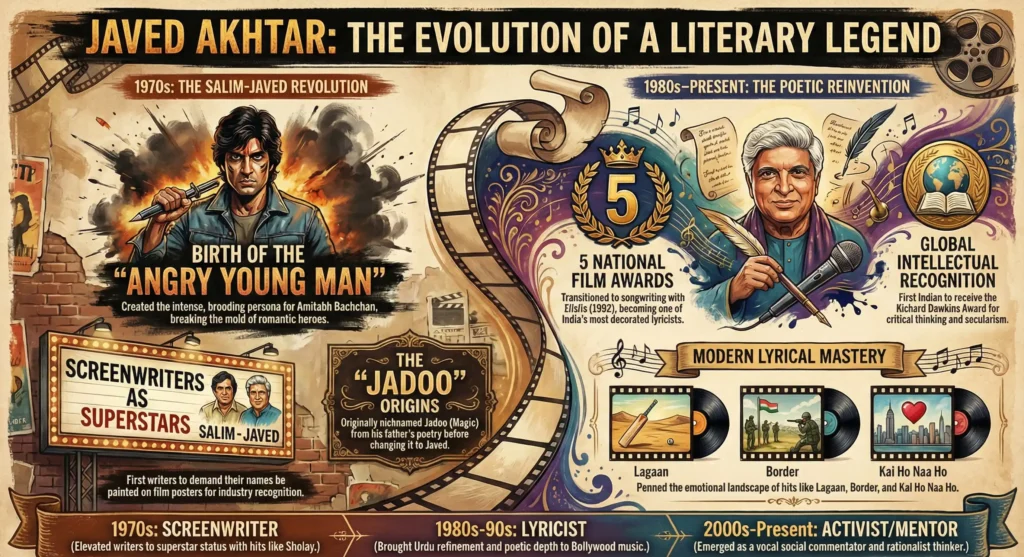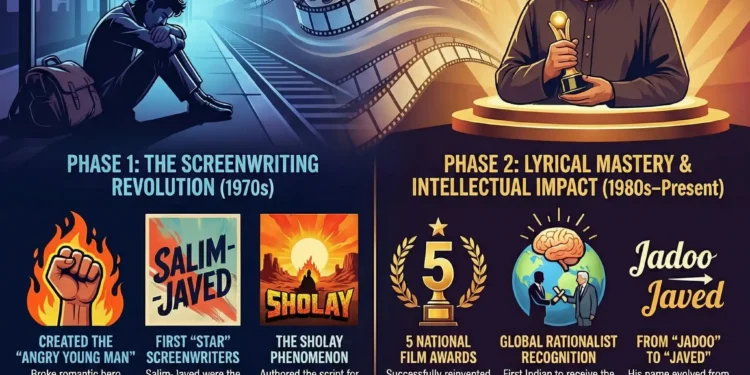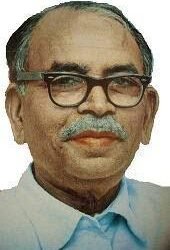Javed Akhtar, born in Gwalior in 1945, is a towering figure in Indian cinema and literature. Starting his career with immense struggle, often sleeping on railway platforms, he rose to fame as one half of the legendary screenwriting duo Salim-Javed. Together, they revolutionized Bollywood with cult classics like Sholay, Deewaar, and Zanjeer. After their split, Javed Akhtar reinvented himself as one of the industry's finest lyricists, winning five National Film Awards. A recipient of the Padma Shri and Padma Bhushan, he is also a vocal activist and the first Indian to receive the Richard Dawkins Award.| Attribute | Details |
| Full Name | Javed Akhtar (Born Jadoo) |
| Date of Birth | January 17, 1945 |
| Birthplace | Gwalior, Madhya Pradesh, India |
| Profession | Poet, Lyricist, Screenwriter |
| Key Awards | 5 National Film Awards, Padma Shri (1999), Padma Bhushan (2007), Sahitya Akademi Award |
| Spouse | Honey Irani (First), Shabana Azmi (Present) |
| Children | Farhan Akhtar, Zoya Akhtar |
| Notable Works | Sholay, Deewaar, Mr. India (Screenplay); Lagaan, Border, Kal Ho Naa Ho (Lyrics) |
Early Life: The Magic of Jadoo

Born into a family of poets and scholars in Gwalior, Javed Akhtar was originally nicknamed “Jadoo” (Magic), a name derived from a line in his father Jan Nisar Akhtar’s poem: “Lamha, lamha kisi jadoo ka fasana hoga”. This nickname eventually evolved into the name Javed. Tragedy struck early when he lost his mother, Safia Akhtar, at the age of eight. Raised by relatives in Lucknow and Aligarh, his childhood was a mix of loneliness and literary immersion. He attended the prestigious Colvin Taluqdars’ College in Lucknow and later graduated from Saifiya College in Bhopal, where his passion for Urdu literature took firm root.
10 Remarkable Facts About Meghnad Saha Life and Achievements
The Struggle: Nights Under the Stars
Javed arrived in Bombay in 1964 with dreams of becoming a director but found himself facing severe poverty. For years, he had no home, sleeping in studio compounds or on railway platforms, often going days without food. He took up odd jobs, including working as a “clapper boy” and writing dialogue for minor films, just to survive. These years of hardship forged the gritty realism that would later define his “Angry Young Man” characters.
The Salim-Javed Era: Redefining Cinema
His fortunes changed when he met Salim Khan. Together, as Salim-Javed, they became the first screenwriters to achieve star status in India.
- The Angry Young Man: They broke the mold of romantic heroes by creating the intense, brooding persona for Amitabh Bachchan in Zanjeer (1973).
- Blockbusters: The duo penned history-making films like Sholay (1975), Deewaar (1975), Trishul (1978), and Mr. India (1987). Their dialogues became part of India’s cultural lexicon.
The Lyricist and Activist
After the duo split in 1982, Javed Akhtar transitioned into a lyricist with the film Silsila. His lyrics were praised for their Urdu refinement and emotional depth. He went on to win widespread acclaim for his work in films like 1942: A Love Story, Border, Lagaan, and Jodhaa Akbar. Beyond cinema, he is a celebrated poet (author of the collection Tarkash) and a relentless advocate for secularism and rationalist thought.
7 Incredible Facts in the Satyendra Nath Bose Biography
Personal Life
Javed Akhtar was first married to screenwriter Honey Irani, with whom he has two children, the celebrated filmmakers Farhan Akhtar and Zoya Akhtar. He later married legendary actress Shabana Azmi, forming one of India’s most intellectually and creatively powerful couples.
Quick Comparison: Eras of Influence
| Era | Role | Key Works | Impact |
| 1970s | Screenwriter (Salim-Javed) | Zanjeer, Sholay, Deewaar | Created the “Angry Young Man”; elevated writers to superstars. |
| 1980s-90s | Lyricist | Silsila, 1942: A Love Story, Border | Brought poetic depth to film songs; won multiple National Awards. |
| 2000s-Present | Mentor & Activist | Lagaan, Om Shanti Om, Gully Boy | Continued lyrical dominance; vocal social commentator. |
Curious Indian Fast Facts
- The Real Name: His original name was Jadoo, taken from his father’s poem. It was later changed to Javed because it sounded similar and meant “eternal.”
- Ghostwriter No More: Salim-Javed were the first writers to demand their names be painted on film posters, fighting for the recognition of writers in the industry.
- The Sholay Script: The original handwritten script of Sholay was titled Majboor and was initially rejected by several producers.
- Family Tree: He is the great-great-grandson of Fazl-e-Haq Khairabadi, a scholar who played a key role in the Indian Rebellion of 1857.
- Richard Dawkins Award: In 2020, he became the first Indian to receive the prestigious Richard Dawkins Award for critical thinking and advancing human progress.
8 Fascinating Facts in the Homi Jehangir Bhabha Biography
Conclusion
Javed Akhtar’s life serves as a powerful reminder that words can indeed change the world. From a homeless youth in Bombay to a Padma Bhushan awardee, his journey is one of immense grit and unparalleled talent. Whether through the fire of Deewaar’s dialogues or the romance of Ek Ladki Ko Dekha, Javed Akhtar has penned the emotions of a nation, cementing his legacy as one of the greatest literary minds of modern India.
8 Remarkable Secrets in the Jagadish Chandra Bose Biography
If you think you have remembered everything about this topic take this QUIZ
Results
#1. What was Javed Akhtar’s original childhood nickname before it was changed to Javed?
#2. Javed Akhtar formed a legendary screenwriting duo with which writer, creating hits like Sholay and Deewaar?
#3. In 2020, Javed Akhtar became the first Indian to receive which prestigious award for critical thinking?
#4. Javed Akhtar is the father of which two celebrated filmmakers?
#5. Which iconic persona did Salim-Javed create for Amitabh Bachchan in the film Zanjeer?
#6. Javed Akhtar’s great-great-grandfather, Fazl-e-Haq Khairabadi, was a scholar involved in which historical event?
#7. After splitting with Salim Khan, Javed Akhtar successfully reinvented himself in which role with the film Silsila?
#8. Javed Akhtar is currently married to which legendary actress?
Who was Javed Akhtar’s writing partner?
He formed a legendary partnership with Salim Khan, known as the duo Salim-Javed.
How many National Awards has Javed Akhtar won?
He has won five National Film Awards for Best Lyrics.
Who are Javed Akhtar’s children?
His children are Farhan Akhtar (actor, director) and Zoya Akhtar (director), both from his first marriage to Honey Irani.
What is Javed Akhtar’s original name?
He was nicknamed “Jadoo” at birth, which later evolved into the name Javed.
Which famous poem collection did Javed Akhtar write?
He authored the acclaimed Urdu poetry collection titled Tarkash (Quiver).
Read More: https://curiousindian.in/farhan-akhtar-january-1974-present/








